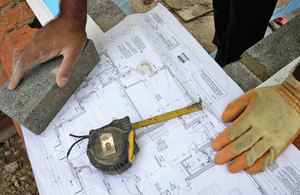Plans to speed up new homes held up with new developer contribution rules
Consultation published on changes to developer contribution rules which will speed up housing delivery.

blueprints
New rules on developer contributions which help fund new roads, schools, play areas and other essential infrastructure have been published for consultation in a move to quicken the pace of housing delivery in England.
Financial contributions are required from developers where additional public infrastructure is needed to support the building of new homes, with the government’s Community Infrastructure Levy collecting almost £1 billion since it was introduced in 2010.
This is part of a package of reforms to address the lengthy and complex process of negotiation for councils that slows down the delivery of new homes, precisely at a time when more are needed.
This will ensure the infrastructure needs of communities are identified from the outset, saving time and allowing the provision of infrastructure to be costed in to projects at an early stage. It also seeks to increase the types of project that can benefit from the Community Infrastructure Levy, ensuring a wider range of community priorities are eligible to receive funding.
Launching the consultation Minister of State for Housing Kit Malthouse MP said:
Communities and developers must know that vital infrastructure needed to support new homes is going to arrive – even before a shovel hits the ground.
The billions of pounds already paid by developers has been critical in delivering the more, better, faster homes this country so desperately needs, but we must go further.
These reforms will make the system simpler, transparent and easy to understand and will accelerate the pace of homebuilding – it’s now up to housebuilders and residents to tell us what they think.
The draft measures, initially announced at the 2018 Autumn Budget, are part of the government’s wide-ranging programme of planning reform and targeted funding to deliver 300,000 homes a year by the mid-2020s.
The consultation takes forward new proposals that will:
- Introduce a new strategic infrastructure tariff, helping fund large-scale projects which benefit multiple communities falling under a combined local authority.
- Widen options on how contributions can be used by councils to benefit their residents, ensuring funds are spent on a wider range of local priorities.
- Increase certainty and transparency by requiring councils to publish details on what has been collected and spent, so communities understand the benefit of development.
- Ensuring the Community Infrastructure Levy responds to changes in land values, ensuring towns and village get the contributions they deserve when planning permission is granted.
These proposals follow on from of a wider package of reform set out in the new planning rulebook adopted in July 2018 – changing the way developer contributions make new homes a reality for the areas which need them.
It sets out that viability assessments are now hardwired into the local plan process, giving communities upfront certainty on the infrastructure investment needed in their area when land is initially earmarked for new housing.
Figures reveal that between 2016-17 around £5 billion was successfully secured from developers through Section 106 agreements to support local communities with new infrastructure and more affordable housing. Separately, the Community Infrastructure Levy has raised an additional £940 million for those areas which have adopted it since 2010.
Further information
The consultation will close to responses on 31 January 2019.
Community Infrastructure Levy
The Community Infrastructure Levy was introduced in 2010 and allows local planning authorities to raise funds from new development, to help fund infrastructure to support the development of their area.
So far, £940 million in levy receipts had been collected by authorities at March 2017.
A total of 227 (67%) English authorities are currently charging or progressing towards charging Community Infrastructure Levy.
Section 106 Agreements
Section 106 planning obligations are negotiated between a local authority and developer on a case by case basis.
In 2016-17, independent research estimated that local authorities negotiated £5 billion towards affordable housing and infrastructure through Section 106 planning obligations.
Office address and general enquiries
2 Marsham StreetLondon
SW1P 4DF
Contact form https://www.gov.uk/gui...
General enquiries: please use this number if you are a member of the public 030 3444 0000
If your enquiry is related to COVID-19 please check our guidance page first before you contact us - https://www.gov.uk/guidance/coronavirus-covid-19-guidance-for-local-government.
If you still need to contact us please use the contact form above to get in touch, because of coronavirus (COVID-19). If you send it by post it will not receive a reply within normal timescale.
Media enquiries
Email newsdesk@communities.gov.uk
Please use this number if you are a journalist wishing to speak to Press Office 0303 444 1209
Social media - MHCLG
Twitter - https://twitter.com/mhclg
Flickr - http://www.flickr.com/photos/mhclg
LinkedIn - http://www.linkedin.com/company/mhclg